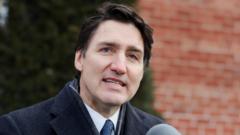In the face of increasing pressure from Trump's presidency, PM Trudeau firmly declares Canada will not entertain notions of becoming the 51st state, despite looming economic threats.
Canada Resists Trump's Push for Absorption: Trudeau's Firm Stand

Canada Resists Trump's Push for Absorption: Trudeau's Firm Stand
Canadian Prime Minister highlights the futility of Trump’s claims regarding U.S. absorption.
In a robust response to former President Donald Trump’s aggressive comments regarding Canadian stateship, Prime Minister Justin Trudeau asserted that there is “not a snowball's chance in hell” that Canada will merge with the United States. This statement comes on the heels of Trump’s repeated insinuations that Canada could become the 51st state, suggesting that eliminating the border would enhance national security.
At a press conference held at his Mar-a-Lago residence, Trump revved up his rhetoric, reiterating that he would impose significant tariffs on Canadian goods unless Canada enhanced security at its shared border with the U.S. In light of these challenges, the Trudeau administration is grappling with its own political turmoil, as Trudeau announced his resignation while remaining in power until a new Liberal leader is selected by March. The suspension of Canada’s parliament until late March further complicates the political landscape amid these economic threats.
Experts caution that if Trump follows through on imposing tariffs post-inauguration, it could devastate the Canadian economy—nearly C$3.6bn (US$2.5bn) in goods and services crossed the border daily in 2023. In response, Trudeau’s government is weighing the option of implementing counter-tariffs. The Prime Minister emphasized on social media that both nations benefit significantly from being each other’s top trading and security partners.
In his press conference, Trump expressed concerns about illegal drugs entering the U.S. from both Canada and Mexico, while he reassured that military force was not on the table for any potential annexation. Nonetheless, he critiqued Canada’s military expenditure, stating its reliance on U.S. defense capabilities is unfair, suggesting that Canada must step up its military spending. Currently, Canada’s defense budget is at C$27bn (US$19.8bn), with plans to ramp it up to almost C$50bn by 2030.
As tensions rise, British Columbia’s Premier David Eby announced that several provincial leaders would be heading to Washington D.C. to lobby against potential tariffs. Ontario's Premier Doug Ford also urged Trudeau to utilize his remaining time to work collaboratively with the provinces to counter Trump’s threats. He highlighted Ontario's vital trade relationship with the U.S., especially in the automotive sector, with trade between the two amounting to over C$493bn ($350bn) in the past year.
Ford jested about countering Trump’s comments by proposing a humorous alternative: acquiring Alaska and including Minneapolis and Minnesota in the deal.
As this diplomatic saga unfolds, Canada remains steadfast against any propositions that challenge its sovereignty, underscoring the critical role of trade relations between the two nations.
At a press conference held at his Mar-a-Lago residence, Trump revved up his rhetoric, reiterating that he would impose significant tariffs on Canadian goods unless Canada enhanced security at its shared border with the U.S. In light of these challenges, the Trudeau administration is grappling with its own political turmoil, as Trudeau announced his resignation while remaining in power until a new Liberal leader is selected by March. The suspension of Canada’s parliament until late March further complicates the political landscape amid these economic threats.
Experts caution that if Trump follows through on imposing tariffs post-inauguration, it could devastate the Canadian economy—nearly C$3.6bn (US$2.5bn) in goods and services crossed the border daily in 2023. In response, Trudeau’s government is weighing the option of implementing counter-tariffs. The Prime Minister emphasized on social media that both nations benefit significantly from being each other’s top trading and security partners.
In his press conference, Trump expressed concerns about illegal drugs entering the U.S. from both Canada and Mexico, while he reassured that military force was not on the table for any potential annexation. Nonetheless, he critiqued Canada’s military expenditure, stating its reliance on U.S. defense capabilities is unfair, suggesting that Canada must step up its military spending. Currently, Canada’s defense budget is at C$27bn (US$19.8bn), with plans to ramp it up to almost C$50bn by 2030.
As tensions rise, British Columbia’s Premier David Eby announced that several provincial leaders would be heading to Washington D.C. to lobby against potential tariffs. Ontario's Premier Doug Ford also urged Trudeau to utilize his remaining time to work collaboratively with the provinces to counter Trump’s threats. He highlighted Ontario's vital trade relationship with the U.S., especially in the automotive sector, with trade between the two amounting to over C$493bn ($350bn) in the past year.
Ford jested about countering Trump’s comments by proposing a humorous alternative: acquiring Alaska and including Minneapolis and Minnesota in the deal.
As this diplomatic saga unfolds, Canada remains steadfast against any propositions that challenge its sovereignty, underscoring the critical role of trade relations between the two nations.





















